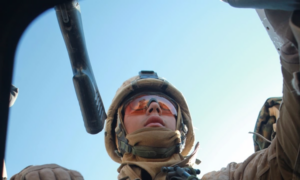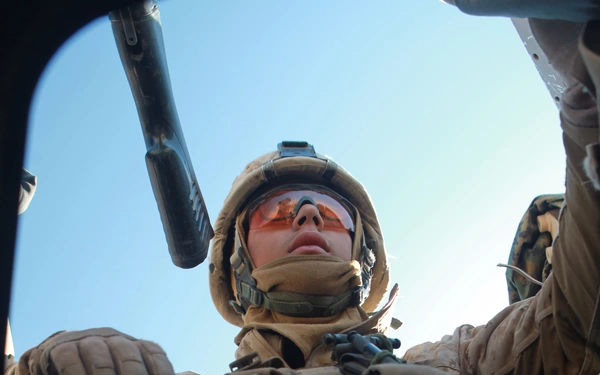A Middle Eastern Veteran’s Struggle with His Own Community

Commentary
My squad drives along MSR (main supply route) Dover, en-route to Camp Anaconda. I stand in the gunner’s position, wearing my face mask and goggles. Dust hit my face as sweat from the desert heat trickled down my face and back. I wore a 50-pound IBA (individual body armor) with extra ammo, my M-16 right next to me in case my trusty .50 cal failed. We approached a one-lane bridge. The Iraqi Army stopped both sides of traffic. My squad stopped to assess the situation. Our battalion commander wanted me to tell the Iraqi soldier standing next to my truck that we needed to keep moving. I spoke with the Iraqi soldier in Arabic. He looked perplexed as if I was somehow speaking a foreign language that he didn’t understand. It was surreal for him. He replied in Arabic, “I don’t speak English.” So, I respond, again in Arabic, saying: “Well how about we speak Arabic then?” He nodded in agreement as a smile spread across his face.
This was one of many encounters I experienced in Iraq. The Iraqis were used to dealing with U.S. soldiers through civilian translators. But they never got used to an American soldier speaking Arabic, who understood their culture. Every time I encountered an Iraqi, they would first tell me that they didn’t understand. They just couldn’t believe a U.S. soldier was speaking Arabic, let alone a U.S. soldier who was also from the Middle East.
What was it like for me to enlist? I was met with fierce opposition from my local Middle Eastern community. I was called everything from the enemy, traitor to a bad son, and a bad example for the younger generation. I heard about fathers going to religious figures in the community asking for advice for their sons so they wouldn’t “end up like me.” All this did was fuel the fire in me even more. I ended up enlisting in the National Guard. I chose to serve part-time for two reasons: I wanted to graduate college, but also wanted to at least try to appease my local community by not just getting up and leaving.
At boot camp, I was alone and didn’t get many letters from home. When I was allowed phone calls, they were brief and awkward. During the final weeks of boot camp and AIT (advanced individual training), we were given our graduation dates. I called home and informed my family of when I was going to graduate. I was told that no one was coming. I knew that might happen. I graduated and went home with no fanfare, no family congratulating me. It was back to normal.
A year and a half later, I got my orders to go to war. I was both scared and excited at the same time. My family, on the other hand, was not happy, understandably so. What parents want to see their child off to war? I also dealt with the backlash from my family and community. At that point, I knew what to expect from them. They would not understand why I had to go. For me, it was my duty to go and fight. It was about my fellow soldiers out there. It was also about protecting those who were not part of that fight. I knew my language and cultural awareness would be helpful to my unit and the civilians I would encounter.
Little did I know the impact I would have.
_______________________
The appearance of U.S. Department of Defense (DoD) visual information does not imply or constitute DoD endorsement.
This article first appeared in The Havok Journal
Views expressed in this article are the opinions of the author and do not necessarily reflect the views of The Epoch Times.




